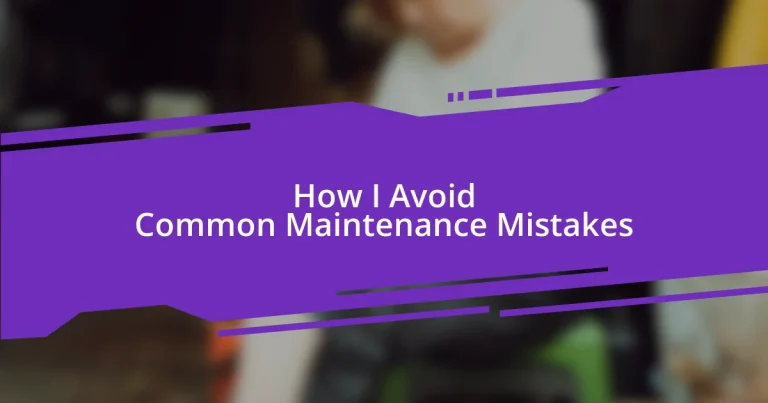Key takeaways:
- Regular maintenance checks are essential for safety, cost efficiency, and extending the life of appliances, helping to prevent larger issues before they arise.
- Prioritizing preventive maintenance fosters a proactive attitude, leading to greater peace of mind and reducing the likelihood of unexpected breakdowns.
- Training staff and learning from past maintenance errors create a culture of responsibility and continuous improvement, ensuring that tasks are managed effectively.
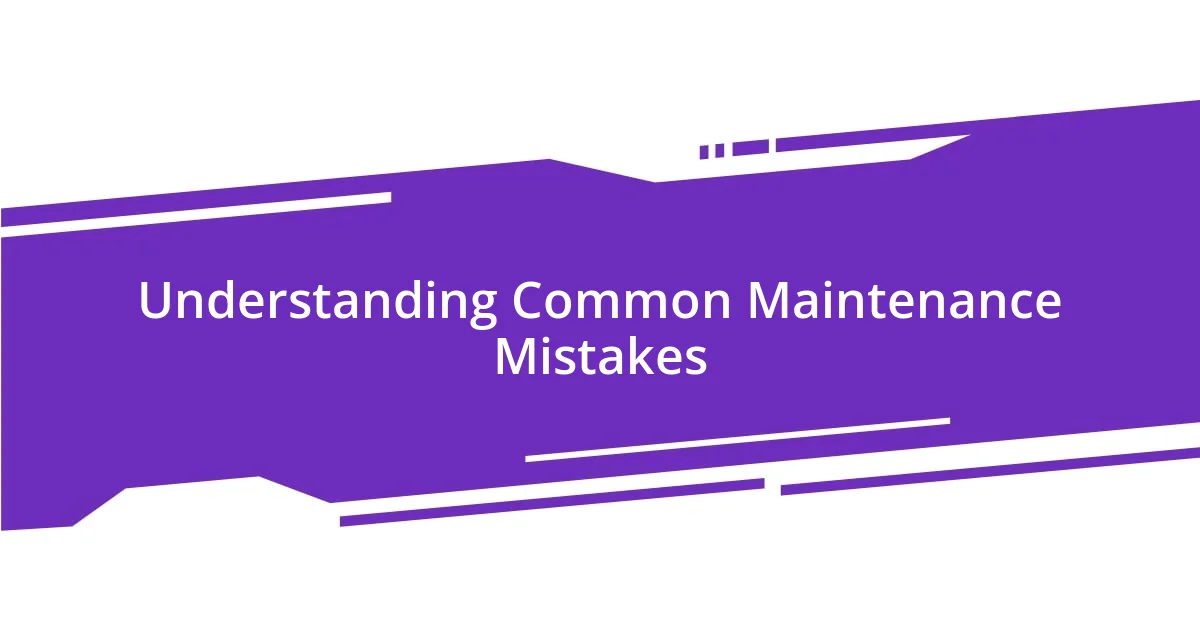
Understanding Common Maintenance Mistakes
Maintenance mistakes often stem from a lack of awareness or knowledge. I once ignored a simple warning light on my dashboard, thinking it wasn’t a big deal. But soon enough, that small oversight turned into a costly repair—an experience I wouldn’t wish on anyone.
Another common mistake I’ve noticed is procrastination in routine maintenance, especially when life gets busy. There were times I put off changing the air filters in my home, only to realize that the air quality subtly worsened and my allergies flared up. Doesn’t it make you wonder how often we sacrifice our comfort for convenience?
I believe it’s crucial to prioritize maintenance instead of viewing it as a chore. Have you ever felt overwhelmed by all the tasks piling up? I have. This realization helped me schedule regular check-ups, ensuring I stay ahead of issues instead of scrambling to fix them later. It’s fascinating how a little foresight saves time and money in the long run.
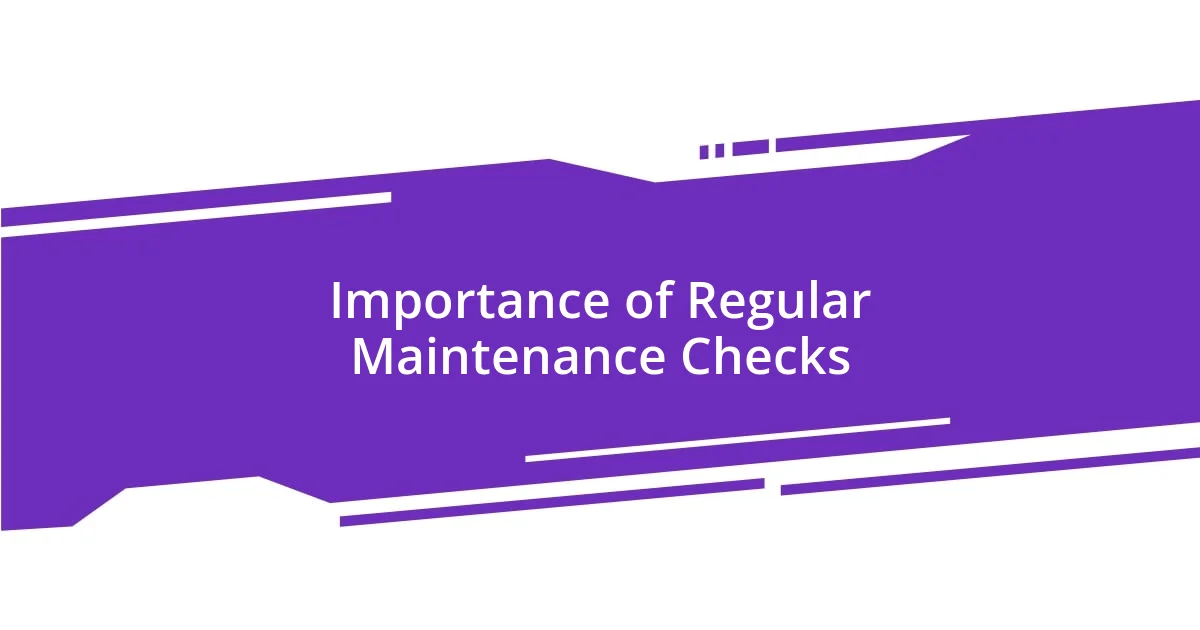
Importance of Regular Maintenance Checks
Regular maintenance checks are not just about keeping things running smoothly; they can significantly impact your safety and well-being. I remember a time when I delayed having my furnace inspected, thinking it could wait until winter. When the first frigid night hit and it failed to work, I was left shivering and calling for emergency repairs at an exorbitant price. That experience taught me the hard way that regular check-ups can prevent uncomfortable, sometimes dangerous situations.
Here are a few key reasons why regular maintenance checks are essential:
- Safety Assurance: Prevent accidents and hazards by identifying issues before they become dangerous.
- Cost Efficiency: Fixing small problems early can save you from costly repairs down the line.
- Efficiency: Regular checks keep systems running optimally, saving you energy and reducing expenses.
- Longevity: Proper maintenance extends the life of your appliances and systems, allowing you to get the most out of your investments.
- Peace of Mind: Knowing that everything is in proper working order alleviates stress and worry.
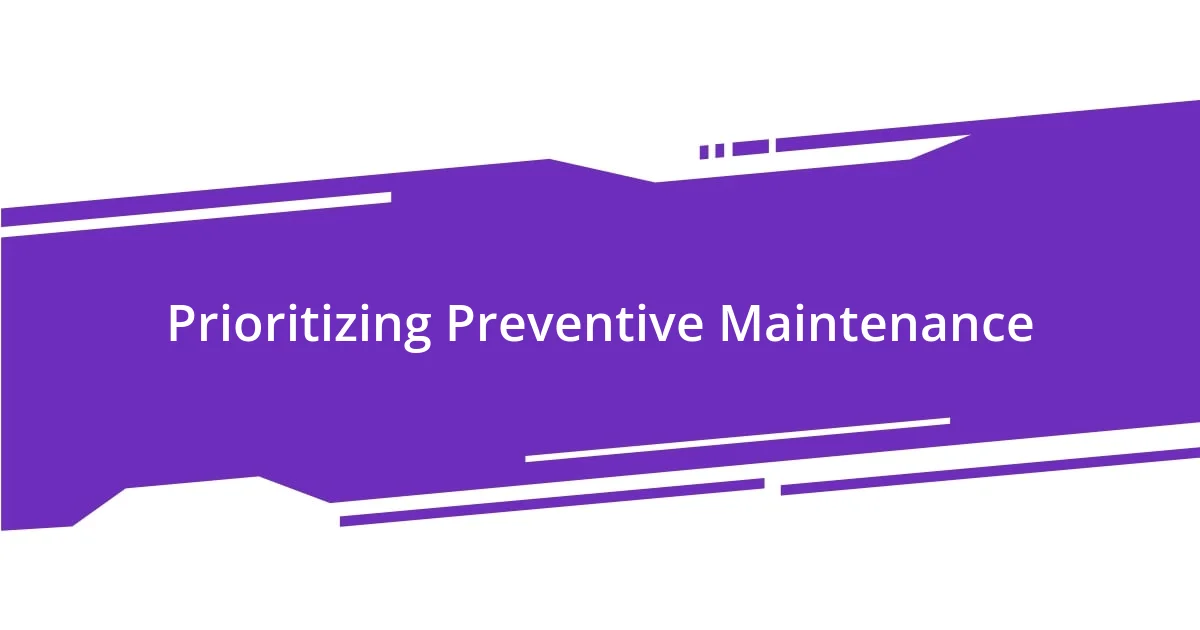
Prioritizing Preventive Maintenance
Prioritizing preventive maintenance has always been a game changer for me. I’ve learned that it’s far easier to give a little time and attention to my home than to face unexpected breakdowns. For instance, I recall a moment when I decided to inspect my car’s fluid levels as part of my routine. The thrill wasn’t just checking off something from my to-do list; it was discovering I was low on brake fluid—an easily overlooked detail that could have led to serious safety issues.
I often reflect on how preventive maintenance can feel burdensome at first. Yet, in my experience, the rewards far outweigh that initial resistance. I remember making it a habit to take inventory of my home’s appliances every season. This little ritual not only keeps everything functioning but also gives me peace of mind, knowing I’m taking charge of my environment. Isn’t it reassuring to know you’re actively preventing problems instead of reacting to them?
Understanding the value of preventive maintenance has made me a more proactive homeowner. Instead of waiting for something to go wrong, I now approach maintenance with a sense of accomplishment. When I replaced the worn-out batteries in my smoke detectors ahead of time, I felt a wave of relief wash over me, knowing my family was safer for it. It definitely reinforces the idea that staying ahead of maintenance tasks leads to lasting benefits.
| Preventive Maintenance | Reactive Maintenance |
|---|---|
| Pros | Pros |
| Prevents costly repairs | Addresses immediate issues |
| Enhances safety | Can be more straightforward |
| Improves efficiency | May provide temporary relief |
| Cons | Cons |
| Requires upfront time and investment | Can lead to larger problems |
| May feel tedious at times | Often more expensive overall |
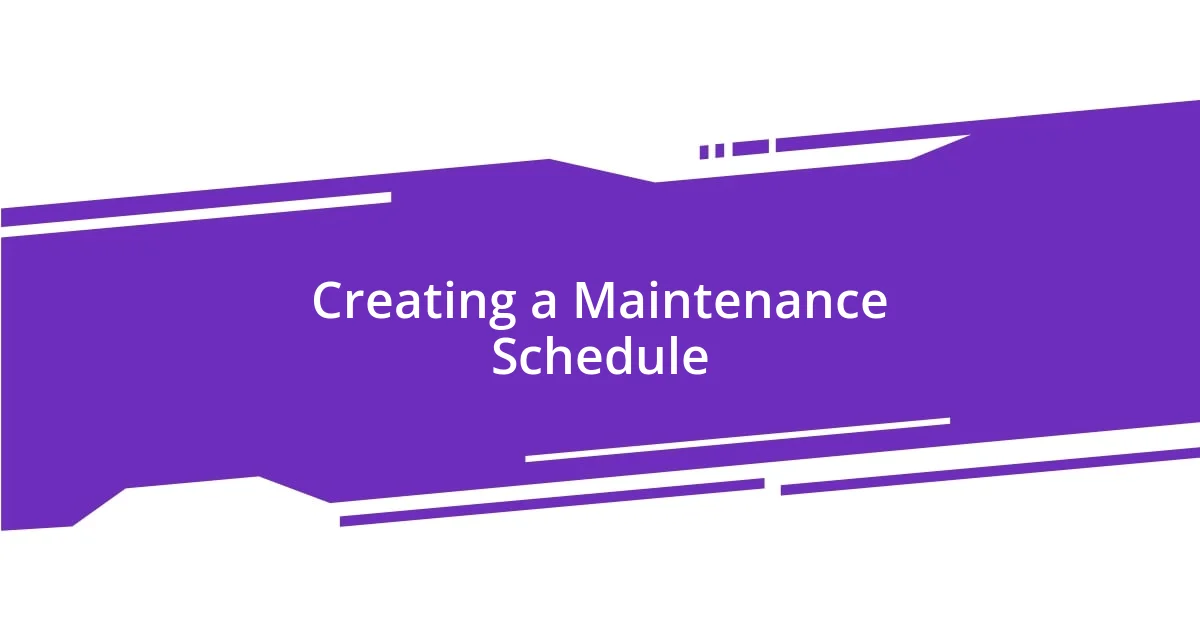
Creating a Maintenance Schedule
Creating a maintenance schedule is one of the most effective strategies I’ve embraced. When I finally sat down to write mine, I realized it wasn’t just about marking dates on a calendar; it was about protecting my home and peace of mind. I remember the joy of setting a simple reminder for changing my air filter monthly. That small, consistent action not only improved air quality but also saved me from future HVAC issues.
I often think about how easy it is to let maintenance tasks slip through the cracks. Just last month, I found myself looking at my home’s exterior and recalling how I neglected to check the gutters. I took a moment to block off a Saturday for that task, and when I finally did it, I felt a rush of accomplishment. It was rewarding to know I was taking proactive steps to prevent water damage before it began.
Are scheduled maintenance tasks enough? I believe adding a layer of flexibility to your schedule can be essential. Life gets busy, and sometimes things need to shift. I usually keep a digital version of my maintenance calendar, allowing me to adjust dates easily. This way, I stay on top of my tasks without the stress of having them looming over my head. By making it more manageable, I find I can approach my maintenance routine with enthusiasm rather than dread.
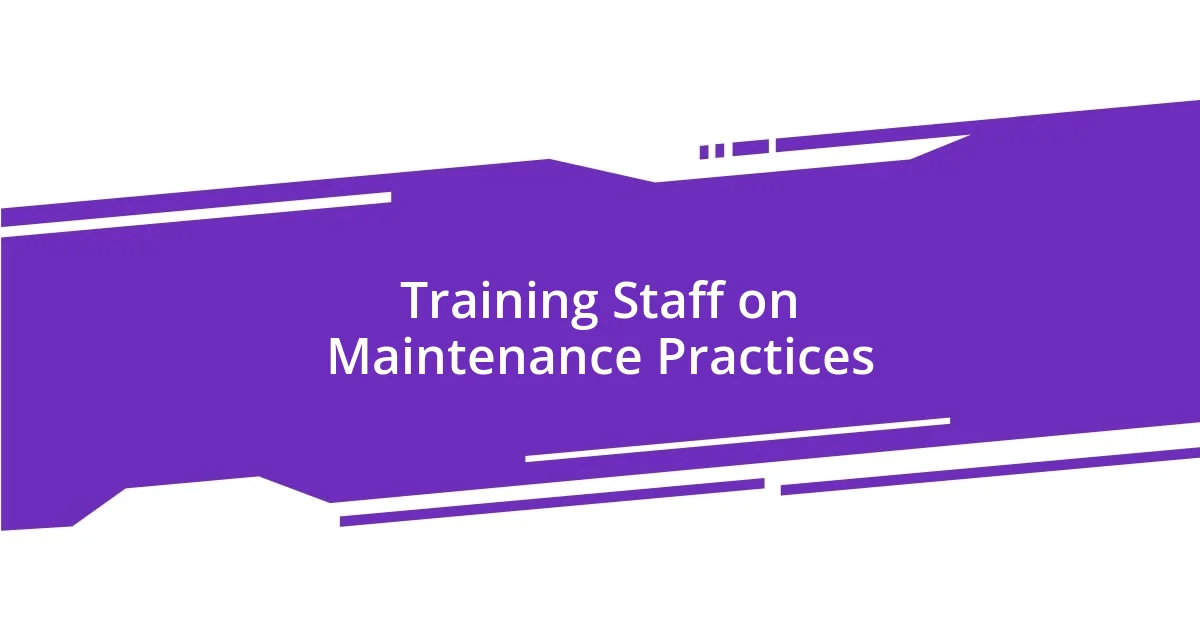
Training Staff on Maintenance Practices
Training staff on maintenance practices is crucial for building a strong foundation of proactive care. I remember my early days managing a small team and the frustration of watching simple tasks slip through the cracks due to a lack of training. I decided to implement regular workshops where we could discuss best practices and share experiences, and it transformed our approach. The moment I saw my team take ownership of their tasks, it felt like a weight lifted off my shoulders.
I often ask myself, how can I ensure my team stays engaged and informed? One strategy that has worked wonders for me is hands-on training sessions. I vividly recall teaching my staff about proper equipment handling by demonstrating each step myself. Watching them grasp the details and then confidently perform the tasks made me realize that personal connection in training creates more than just knowledge; it fosters a culture of safety and responsibility. Have you ever tried this method? I wholeheartedly recommend it.
To keep maintenance practices fresh in everyone’s mind, I also introduced a mentorship program within our team. Each experienced member is paired with a newcomer to pass on knowledge and skills directly. It’s amazing to observe that sense of camaraderie develop, where seasoned employees take pride in guiding others. Not only does this method create a supportive atmosphere, but it ensures continuity in maintaining our standards. When was the last time you witnessed someone light up at a “Thank you for teaching me!” moment? That’s what truly energizes a team.
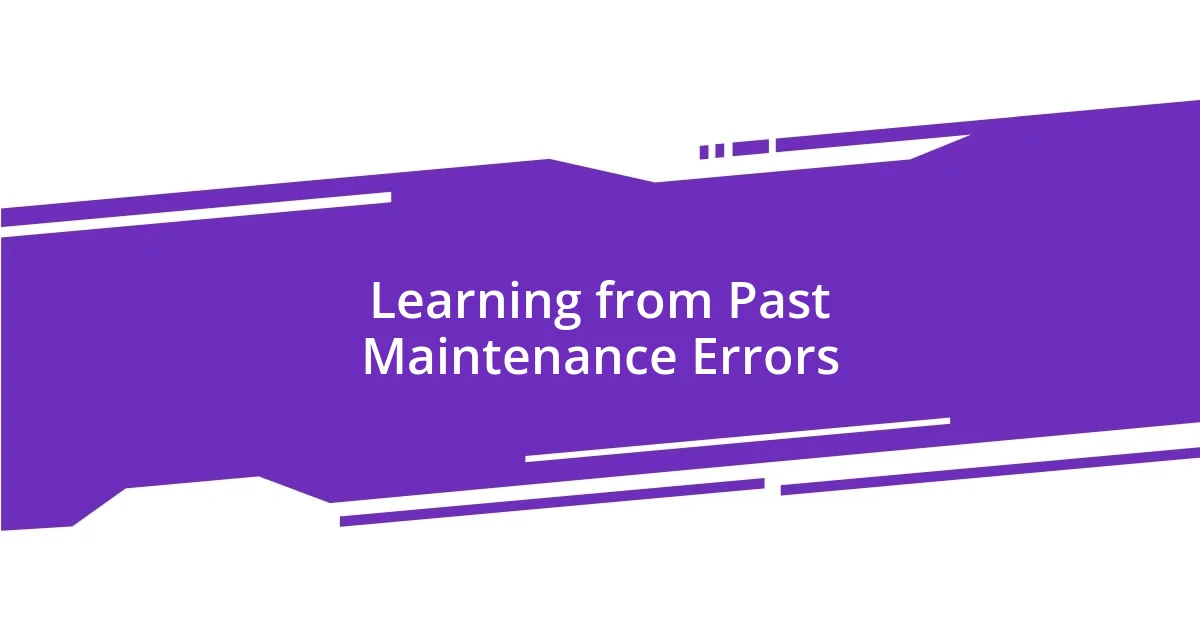
Learning from Past Maintenance Errors
Reflecting on maintenance mistakes from my past has been an invaluable teacher. I remember the anxiety I felt after neglecting a routine inspection of my water heater, only to find it leaking one morning. That experience taught me that even a simple task can have serious repercussions, reinforcing the importance of diligence in every maintenance duty.
One memorable incident involved my lawnmower. Due to my oversight, I skipped seasonal tune-ups and, as a result, ended up with a machine that sputtered and stalled halfway through mowing. It was a frustrating reminder of how minor neglect can lead to larger frustrations. I learned that embracing these small, proactive measures not only saves time in the long run but also brings peace of mind.
I often ponder the question: What would I change if I could go back? The answer is simple—prioritize every task, no matter how minor it seems. Each task I completed that was previously overlooked felt like a victory, and now I make a point to review my maintenance log regularly. This sustained awareness keeps me focused and engaged, eliminating the same mistakes from creeping back into my routine. What about you? Have you found a way to turn past errors into a stepping stone for improvement?












